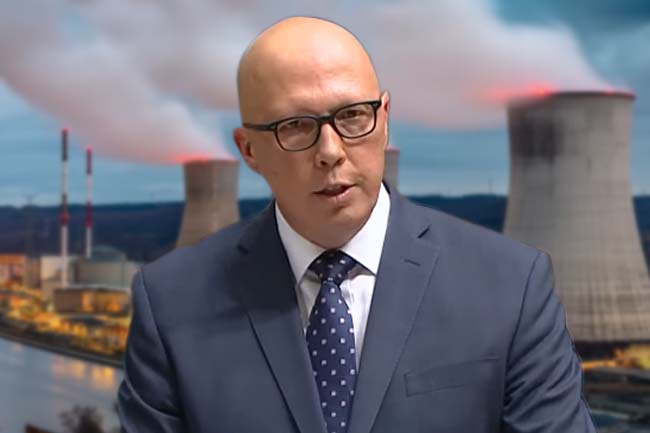The Biden Presidency is expected to undo much of the damage caused by Trump's time in office and will hopefully inspire our own government, writes Professor John Quiggin.
THE DISASTROUS PRESIDENCY of Donald Trump is finally over. The world is in a terrible state, made worse by Trump’s crimes, but this is still a day for hope. With competent administration and science-based policies, the COVID-19 pandemic will be brought under control in the U.S. and elsewhere, hopefully by the end of this year. The existential threat of global heating remains, but here, too, there is plenty of good news.
Despite being overshadowed by the pandemic, the transition from a carbon-based economy to one based on sustainable energy has accelerated over the last year. Trump and his allies have done their best to obstruct this, but have only managed to throw up temporary roadblocks. Some of these roadblocks, such as Trump’s withdrawal from the Paris Agreement and his approval of the Keystone pipeline have been smashed on President Joe Biden’s first morning in office.
Others, such as Trump’s gutting of vehicle fuel economy, will take a while longer to reverse. But carmakers know the changes are coming and would be foolish to wait until they are in place. Many including Ford, Volkswagen, Honda and BMW agreed to stricter standards imposed by California even before the Election. Others, most notably General Motors, reversed course once Trump was defeated.
Meanwhile, the replacement of coal-fired power by renewables, which continued apace under Trump, will accelerate under Biden. On Trump’s last day in office, the U.S. Court of Appeals struck down Trump’s attempt to stop the Federal Government regulating greenhouse gas emissions from power stations. This should mean the closure of most coal-fired power stations, sooner rather than later.
Importantly, while Trump said a lot about his love for coal miners, his Administration did nothing to help them as coal mines were closed, employment fell by 24 per cent and mining companies used bankruptcy to avoid their obligations to pay retirement benefits.
By contrast, Biden has committed to making an “unprecedented investment in coal and power plant communities” including helping to diversify their economies and securing health and retirement benefits for workers.
There has also been substantial progress elsewhere in the world. Europe’s shift from coal is exemplified by Portugal, which will close down its last coal-fired power station in December, joining Austria, Belgium and Sweden. By 2030, coal-fired electricity will be a fading memory in most European countries.
There have been even more striking developments in Asia. Plans for coal-fired power have been scaled back drastically in Bangladesh, Pakistan, the Philippines and Vietnam, previously seen as the main hopes for future growth. Coal has already peaked in India. China is still building coal-fired power stations but has committed to carbon neutrality by 2060. Japan and South Korea made similar commitments with a 2050 target date.
Where does this leave Australia? Our political class treats coal as a matter of domestic politics, driven by climate denialists on the LNP side of politics and advocates of coal mining like Joel Fitzgibbon on the Labor side. They operate on the assumption that no one outside Australia is paying attention. This is not the case. CNN recently described Australia as ‘the last Western holdout on the climate crisis’.
The Washington Post observed that ‘Biden’s plan to combat climate change leaves coal-loving Australia an outlier’. Coal has few friends in Washington these days and Australia is identified closely with coal.
Our problems have been exacerbated by the Morrison Government’s embrace of Trump and Trumpism. Even after the storming of the U.S. Capitol, Morrison (almost alone among U.S. allies) refused to criticise Trump or to deal with the backbenchers who repeated Trump’s treasonous lie that Biden had stolen the U.S. Election. It is unlikely that the Biden Administration will punish Morrison for this. But any request for special help is likely to fall on deaf ears. And we are now likely to need help.
The biggest foreign policy problem we face right now is our dispute with China, triggered by our eagerness to assist Trump in pinning the blame for the pandemic on the slow initial response there. Central to this is China’s ban on imports of Australian coal. Far from getting the support we might expect as a U.S. ally bullied by a dictatorial regime, the attitude of the mainstream U.S. media is that we are getting our just desserts.
The New York Times story on the issue begins with the observation:
‘China is forcing Australia to confront what many countries are concluding: The coal era is coming to an end.’
As the U.S. emerges from the shadow of Trump, it is time for us to the same. The future is bright if we choose to embrace it.
John Quiggin is Professor of Economics at the University of Queensland and the author of 'Zombie Economics and Economics in Two Lessons'. You can follow John on Twitter @JohnQuiggin.
Related Articles
 This work is licensed under a Creative Commons Attribution-NonCommercial-NoDerivs 3.0 Australia License
This work is licensed under a Creative Commons Attribution-NonCommercial-NoDerivs 3.0 Australia License
Support independent journalism Subscribe to IA.














